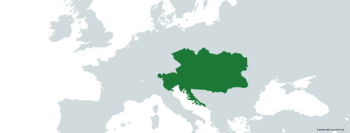Austrian Empire (Deutscher Bund)
Austrian Empire Kaisertum Österreich (German) | |
|---|---|
| 1804–1919 | |
| Motto: A.E.I.O.U (German: Alles Erdreich ist Österreich untertan) "All the world is subject to Austria" | |
| Anthem: Kaiserhymne | |
 | |
| Status |
|
| Capital and largest city | Vienna |
| Common languages | German, Hungarian, Czech, Slovak, Polish, Slovene, Serbo-Croatian, Romanian, Italian, Ukrainian |
| Demonym(s) | Austrian |
| Government |
|
| First: Franz Joseph I of Austria Last: Franz Ferdinand I of Austria | |
| History | |
• Established | 11 August 1804 |
• Fragmentation | 10 September 1919 |
| Currency | Vereinsthaler |
This article is incomplete because it is pending further input from participants, or it is a work-in-progress by one author. Please comment on this article's talk page to share your input, comments and questions. Note: To contribute to this article, you may need to seek help from the author(s) of this page. |
The Austrian Empire, (German: Kaisertum Österreich) was a multinational Central-European great power from 1804 to 1919, created out of proclamation of Emperor Francis II. It was the third most populous polity in Europe after the Russian Empire and the United Kingdom, and the second largest by area throughout its existence.
The empire was proclaimed in response to the Coronation of Napoleon by Francis II, which unified the possessions of the Habsburgs under one central government. It was briefly a member of the Holy Roman Empire until its dissolution shortly thereafter in 1806; and later became a state of the German Confederation and the German Federation. It was an enemy of Napoleon's First French Empire throughout the Napoleonic Wars, except for a period between 1809-1813, when Austria was allied with France and then neutral during the first few weeks of the Sixth Coalition War. Austria emerged as one of the victorious powers after the war and oversaw peace negotiations at the Congress of Vienna.
The Congress of Vienna saw the German Confederation founded soon-after, with Austria and Prussia as its competing yet leading members. The revolutions of 1848 saw the collapse of the German Confederation and the proclamation of the short-lived German Empire before being reformed into the Template:German Federation. Austria maintained its sovereignty outside of the Federation, using the term "Austrian Empire" to describe the lands controlled by the Habsburgs within and outside Germany. Internally, the lands included within the German Federation were referred to as "German Austria".
The empire left the German Federation with its dissolution in 1918, and later joined its successor state of the catholic-dominated South German Federation for a brief period before the Treaty of Linz led to the dissolution and partition of Austria.